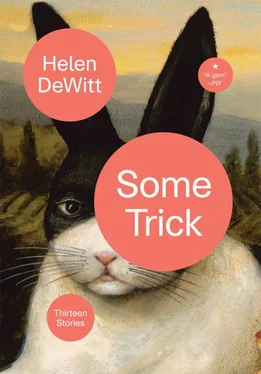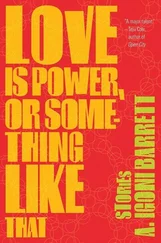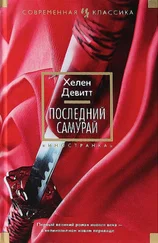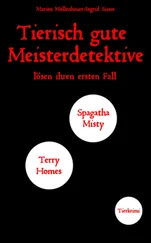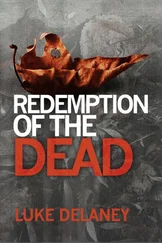‘“But my dear chaps! You’re not eating!” he cried. “Try the hummingbirds, I assure you they are excellent. Or a morsel of lamb? And you must, you positively must sample the mare’s milk cheese, it is a speciality of my people, a great delicacy. Fatima! See that the gentlemen have some cheese!”’
Maria crossed her legs, shifted on her seat, held her elbows. She had been, from time to time, slightly put out by Edward’s habit of modulating out of dialogue into anecdote, but she had supposed it to be, at least, a matter of spontaneous impulse. This mechanical repetition was something quite other and alarming.
‘We turned in soon after. We never saw our host again: in the morning the Nubian appeared with a message on a tray. I took it, and he disappeared without a word. It was from Mahmet:
‘“My dear chaps,
Business calls me away unexpectedly. So sorry to interrupt our larks together! Please avail yourselves of the yacht for as long as convenient. What a story for your grandchildren! You can tell them you were once shipwrecked with
Sindbad the Sailor”’
Edward paused dramatically before the name, and after pronouncing it fell silent, ending the story with a resounding close. He leant back into the corner of the compartment with a little expectant smile. Maria smiled back nervously. So well-rehearsed a performance seemed to call more than ever for applause. What conversational alternatives were there? Would it be acceptable to repeat her comments of last time? Would Edward recognise them, and realise that he had told her the story before? Maria felt that this would be hideously embarrassing. She must come up with something new. At the same time it seemed unfair: she must improvise because he had rehearsed.
Perhaps it was a matter of rehearsing conversations until one got them right. Perhaps she had not responded well enough last time, so that Edward had had a niggling sense that a proper performance of story and reception had not taken place; perhaps this was her chance to improve. This was an alarming thought: if she did not rise to the occasion, the story might be brought out again and again until she perfected her reply.
‘What a marvellous story!’ she exclaimed hastily. ‘I’ve always adored The Count of Monte Cristo — there’s a wonderful Dumasian quality about this, isn’t there, the European swept suddenly from the midst of the working day technological world into the fantastic improbabilities of the Orient!’
‘Yes,’ said Edward, smiling agreeably, ‘one did rather feel that one had been catapulted into a big baggy monster of romantic French historicism. Thoroughly enjoyable for someone with low tastes like me, but a terrible trial for poor Angus, who felt he’d done nothing to deserve it. He stalked off the yacht at the earliest possible opportunity, injured innocence writ large on his brow.’
The Rapide hurtled through France. It was night; the windows of the compartment showed Edward and Maria only themselves surrounded by the paraphernalia of travel: the Spectator , some paperback mysteries, one of the Lucia books (Maria was not yet enough at ease to buy herself Vogue ); a partially eaten Cadbury’s Fruit and Nut bar, a packet of Jaffa cakes, a couple of oranges; a thermos flask of tea. The hours of travel had been punctuated by the recounting of anecdotes, many of them familiar to Maria. After each story Maria would pick up a theme for comment in the counterpoint which must follow; Edward would develop it briefly, then silence would fall. Sometimes Maria would bring out a new subject, which would be canvassed for a few moments before it reminded Edward of another story. Sometimes they turned to each other and smiled, and kissed, abandoning the struggle to converse.
The morning brought other pleasures. They sat in the dining car, looking at each other brightly across a table with a cloth. A waiter brought croissants and a pot of very strong coffee. They reached eagerly for croissants, for jam, drank coffee, set their cups down with a little sigh.
‘Why is it, do you suppose,’ said Edward, ‘that the Continental breakfast has only to cross the Channel to be so damp and depressing. It seems simple enough — why does it travel so badly? In England one wonders whether it is really meant to be eaten. Here it is invariably ambrosial.’
‘It is the tyranny of the toast rack,’ said Maria. ‘No self-respecting bed and breakfast can be without them; and once you’ve invested in the technology you’re committed to sliced white. But if you offer croissants and pastries of course no one will touch the white toast, so no one ever does offer anything else. They feel they must get a return on their investment.’
‘There is something in what you say,’ said Edward. ‘But that doesn’t account for everything. Why are croissants in England so awful? You never mind not having them because they taste like limp cardboard anyway.’
The subject of food is like Chopsticks: almost anyone can improvise on it. Two people who devise variations on something simple and silly end of course by collapsing into laughter: Edward and Maria smiled at each other in relief.
The yacht was comfortable, nothing remarkable. The islands, of course, were enchanting. They’d go for walks in the morning, not too early, taking a picnic lunch; stop at the beach, spread towels, eat brown olives and feta and yellow tomatoes and funny bread, drink retsina or local plonk; spend the afternoons swimming in the limpid water.
Edward had been there before and had lots of stories: about German tourists solemnly pacing through an olive grove at Mystras, heads popping up and down as they consulted an archaeological guide, sneering at the merely Byzantine and poking about for a few dusty stones of Sparta; of Americans looking haplessly round the local taverna, speaking wistfully of McDonald’s; of the plausible scoundrel who’d wanted only to open a high-class tourist shop in Rhodes, to sell genuine local handicrafts made in Taiwan.
Maria smiled and laughed. Everything was new to her.
‘Oh look!’ she cried; it was a fat old woman in black with a mule and a CD Walkman; it was a gnarled old man in Nikes with a sheep round his neck; it was a couple of very beautiful young men in very tight Calvin Klein jeans, ‘and they say there’s no such thing as Platonic love! Alive and well and on the strut in the agora, wouldn’t you say?’
But it was hard to be perfectly at ease.
Novelty disturbed Edward; he made an awkward remark or two about the old woman, was only happy when he had been reminded of one he saw years ago and could supply a polished little story for the occasion. Repetition disturbed Maria; it was like trying to play jazz with someone who has the sheet music for ‘Ain’t Misbehavin’’ and works it in whenever he can.
They met a couple of college pals of Edward’s in Lesbos, and took them back to the yacht for dinner.
‘Not very grand, but perfectly seaworthy,’ Edward said agreeably, leaping to the deck from the pier. ‘One learns to appreciate these things. Did I ever tell you of the time I was shipwrecked?’
If he had no one would admit to it.
‘Oh, it was yonks ago, when Angus McBride and I went island hopping after Finals,’ said Edward, leading the way to the bar. ‘(What can I get you? I think we’ve got all the usual.) Altogether a fantastic tale! We’d booked onto something that sounded perfectly respectable — the Hellenic Swan or some such thing — but turned out to be a great tub of a Victorian yacht which had been restored and put to work for the tourist trade…’
Edward and Maria return to the little house they have bought in Leckford Road, Maria trailing the past behind her. Every conversation she has had, every story she has heard, is on record in her phonographic memory, and on record also are the responses made by all the people she has ever known, and the records of her friendships are the most complete. Perhaps friendships are a matter of similar collections: you have the original, the friend has a backup. Her conversations with Edward are all on record, but hers is the only copy.
Читать дальше
